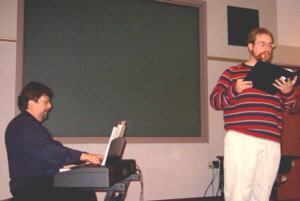"Bonnie Blue Flag," Not "Dixie," Was Rebels Favorite Song, Says Leo Najar
Music of the Civil War Enlivens Civil War Round Table at Lincoln Center
March 19, 2005
By: Dave Rogers

Pianist Leo Najar and Tenor Mark Mooningham present "Civil War Parlor Songs" to an appreciative audience at a meeting of the Seventh Michigan Cavalry Civil War Round Table.
"Hurrah! hurrah! For Southern rights, hurrah! Hurrah! For the bonnie blue flag that bears the single star." (Lyrics from South's favorite song, "Bonnie Blue Flag," during the Civil War.)
Singing "Bonnie Blue Flag" in Yankee-occupied NewOrleans could get a songster arrested, said Bay City's favorite musical empresario, Leo Najar, in a rare performance-based presentation to the Seventh Michigan Cavalry Civil War Round Table.
"The North was afraid of that song because it had the power to stir the emotions and urge people to action," commented Mr. Najar. "It became a prominent Southern song and singing it became a treasonable offense," he added.
"Bonnie Blue Flag" was extremely popular, rivaling the Yankee originated piece "Dixie" as the unofficial Confederate national anthem, according to Mr. Najar.
The song's author, Harry McCarthy, an Arkansas comedian today considered "the Civil War's Bob Hope," was a Southern sympathizer trapped in New Orleans. With the fame of his 1861 marching song growing, he was expelled from the city by Union officials, fled north to Philadelphia and eventually went to Europe.
Tenor Mark Mooningham, of Saginaw, a graduate student in Music at Wayne State University,was the "voice" of Director Najar's presentation, entitled "Civil War Parlor Songs." Mr. Mooningham, a violinist also studying voice, had only a few weeks to master the lyrics and melodies of the nine pieces presented to Mr. Najar's keyboard accompaniment. Mr. Mooningham also is studying directing with Mr. Najar.
Union songs like "The Battle Cry of Freedom," by prolific Civil War composer George Frederick Root, showed the "uncompromising spirit" and one-sided ideology of songs of the era, he said. "Revenge was a frequent theme."
Perhaps the most poignant tune the duo performed was "Little Major," an 1862 piece by Henry Clay Work, about a little drummer boy dying on the battlefield.
Another was "Jeff in Petticoats," a comic piece poking fun at Confederate President Jefferson Davis, who after the war had ended reportedly tried to escape the Yankees dressed as a woman.
"We Are Coming From the Cotton Field," an 1864 composition by J.C. Wallace, concluded the presentation. It was one of many emancipation songs flowing from the pens of musical authors as the war wound down.
A program on Civil War Music will be performed by the Bijou Orchestra in the future, said Mr. Najar, director of the orchestra.###